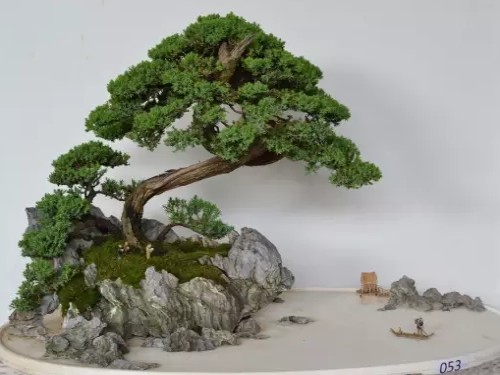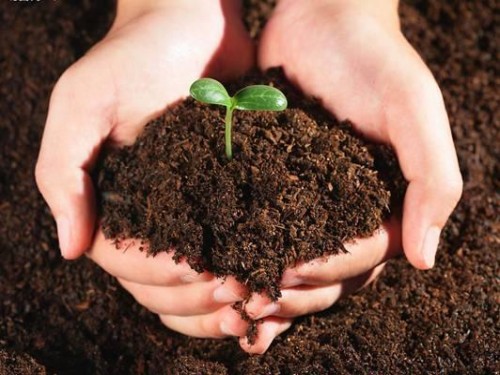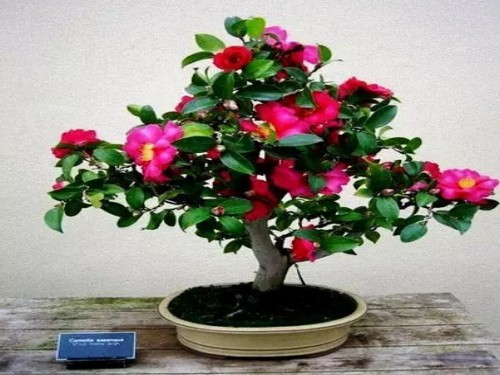Notes on purchasing bonsai
What is bonsai? Bonsai art originates from China, has a long history and has a long history. It takes pots as paper and trees as paintings. Through ingenious processing and cultivation, it uses traditional Chinese painting techniques that are thousands of miles away and small to see the big, giving people the artistic feeling of "one tree leads to towering ancient trees, one peak leads to Huashan thousand fathom, and one spoon leads to thousands of miles of rivers and lakes". The spirit and shape reproduce the style and features of nature at the same time, and it is full of poetic and picturesque feelings in the hilly forest spring, so as to achieve the artistic effect which comes from nature and is higher than nature. Therefore, bonsai is called "silent poetry, three-dimensional painting", and is famous all over the world for its "living sculpture".
At the beginning of contact with the purchase of bonsai, the key is to consider the planting environment, and then choose suitable tree species.

How to choose the first bonsai?
Bonsai prices vary according to tree species, techniques, years, and so on. It is recommended that beginners find a reputable bonsai garden and start with saplings or cheap bonsai materials. Do not buy at will because of impulse, buy home can only watch bonsai wither, love bonsai heart gradually haggard, from now on do not want to contact bonsai.
When buying bonsai, you should pay attention to the following factors:
1. Select healthy plants:
Check the leaf surface if there are withered yellow, spots, curls and other abnormal phenomena, may have been infected or suffered from insect pests. The back of the leaf also needs to be checked, and some bugs will hide on the back of the leaf, so you should pay attention to it when buying.
The branches and cadres should be thick, produce more branches, have dense leaves, and the trees should be strong and healthy.
The root plate should be slightly exposed, which means that it has been planted for a period of time and has not yet taken root. If it has just been changed or the cuttage has not yet taken root, there may be problems such as maladjustment or inability to take root, and the risk is greater. You can wait for a period of time to watch the trees before deciding whether to buy them.
2. Demand for the environment:
(1) Sunshine and placement site: full-day sunshine, half-sunshine, if indoor bonsai has been accustomed to indoor environment, if rashly moved to the outdoor, can not adapt to the changes of the environment, it is easy to cause injury.
(2) Climate and environmental temperature: spring, summer, autumn, winter, rainy season, etc., different tree species have different environmental requirements. Before domestication, the same growth environment should be given according to the origin, and then slowly domesticated. It is suggested that beginners can buy tree species that have adapted to the local environment.
(3) soil: bonsai growth must absorb nutrients from the soil from the roots, so the soil is very important for plant growth. Bonsai soil needs to choose soil with good ventilation and drainage. If the soil becomes sticky and drains badly after watering, oxygen can not enter the soil. The root of the plant will blacken and rot if it is trapped inside.
(4) Fertilizer: plants absorb more than 16 kinds of elements from the soil, generally the soil in the mountains is natural soil, the natural soil contains the nutrients needed for plant growth, and the soil in the bonsai basin has limited nutrients, so additional fertilizers are needed to supplement the insufficient nutrients.
(5) watering: there is a saying often spread in the bonsai world: "watering takes three years", meaning that it takes three years to learn to water. Potted plants are watered not only because you water the roots to absorb water, but also because the newly poured water expels the old air from the original soil and introduces new air, which promotes the respiration of the roots of the plants in the basin. Watering must wait for the soil surface to dry and then irrigate. If you take care of it too carefully and often water it, the water in the soil will not be breathable and will easily lead to rotting roots.
3. Prevention and control of diseases and insect pests
If there are insurmountable problems in the process of bonsai maintenance, such as infection, insect pests, and unidentifiable causes, please contact the original buyer or find an experienced expert to inquire, do not prescribe medicine indiscriminately, so as not to be irreparable.
Talking about the matters needing attention in the purchase of bonsai, I wish you a good start when you plant bonsai. Watching your favorite bonsai thrive day by day, you naturally have an indescribable sense of satisfaction and achievement.
When purchasing seedlings or blanks for making bonsai trees at farmers' markets or florists, you should pay attention to the following points:
1. Adjust measures to local conditions
To buy seedlings or tree blanks for bonsai production, you should choose a suitable variety according to your own cultivation conditions. Some beginners make bonsai trees and don't know much about the habits of some trees (mainly like sun or shade tolerance and adaptability, such as banyan and Jiuli incense, which can grow in the south and north of our country, but the adaptability of vertebrae is poor. Poor growth in the north), that is, blind purchase. Some of the places where they grow their own trees do not have enough light, but they buy trees such as Xiyang black pine, Tamarix, five-needle pine, plum blossom and pomegranate, resulting in the phenomenon of "one year green, two years yellow, three years to see the king of death". Although some survived death, they grew poorly, and plum blossoms and pomegranates did not blossom or blossom very little. If there is not enough light in the cultivation place, you should buy some trees with strong adaptability and shade tolerance, such as boxwood, Luohansong, June snow, sparrow plum and so on. If there is a small yard and a small greenhouse at home, there will be a wide range of trees to choose from. There are many kinds of trees that can make bonsai, but nothing is more popular than evergreen and flowers and fruits. Flowers wither and fall in winter, especially the lack of red and little green in the north, if you put a few pots of evergreen bonsai in the room, it will add vitality to the room.
2. Make it easy to survive
When buying bonsai trees or seedlings, we should not only pay attention to the species of trees, but also see whether the trees can survive. To judge whether a seedling or a tree bonsai can survive is mainly by watching the growth of roots, branches and leaves. Plant growth mainly depends on fibrous roots to absorb nutrients and water, trees without fibrous roots or few fibrous roots are difficult to survive. Although some trees have a lot of fibrous roots, they are seriously dehydrated or have dried up, and it is difficult to survive.
At the same time, it also depends on whether the branches and bark are full and correct in color. If the branches and bark shrink or the color is not the same as the normal growth of the tree, it means that the tree has been dug out for a long time, or the plant has lost too much water due to poor safekeeping, and it is difficult to survive. Some trees have leaves, so it is easy to judge whether they can survive. For example, if the leaves are green, the survival rate is high; if the leaves are yellow, they will fall off with the touch of their hands, and the survival rate will be low.
In addition, it should be noted that those with lodging soil at the root are easier to survive than those without lodging soil. Because the root soil retains some intact fibrous roots and contains a certain amount of water. Over the years, it is common for florists and florists to cheat money by digging up trees with little or no fibrous roots from the mountains and selling them with the lateral roots, fibrous roots and straw of other trees. those who lack experience are often fooled.
3. Pay attention to observe the growth trend
Bonsai is a kind of plastic art, the advantages and disadvantages of a tree bonsai does not depend on its size, nor entirely on whether the tree species are valuable or not, but mainly depends on its growth. Under the premise of survival, plants with promising culture prospects should be purchased as far as possible.
The cultivation prospect of a tree stump or seedling is mainly observed from three aspects: root, stem and main branch.
Generally, the root system is well developed, with thicker lateral roots and more fibrous roots, which is suitable to be cultivated into the state of "hanging roots and showing claws" in the future.
Tree trunk is the main basis for determining the style of tree bonsai, and most of the tree bonsai styles are named according to the different posture of tree trunks. Especially after potting, it is easy for the trunk to grow high, but it is difficult to grow thick, and the trunk is generally rough, so it is very difficult to change the original shape. Therefore, when selecting stumps and seedlings, it is better to have a thick and short trunk with certain twists and turns. However, some straight-stem stumps also have their own characteristics, and if the branches are handled properly, they are also very beautiful.
In addition to the root and trunk, it is also necessary to observe the ratio of the main branch to the trunk, such as the thickness of the main branch and the trunk are not much different, the bonsai made of such tree material is not beautiful. At the same time, it depends on the distribution of the main branch. the opposite state of the main branch is not beautiful, and it is easy to shape if it is alternate.
Time: 2019-05-22 Click:
- Prev

How to prepare culture soil-preparation method of bonsai culture soil
Soil is the basis of plant growth. In order to cultivate bonsai plants, we must first make a good soil. The growth of plants in the limited basin soil is directly related to whether the basin soil is suitable for plant growth habits. Potted soil can fix plants and supply nutrition, water and air. General potted plant use
- Next

New year and Spring Festival are suitable for bonsai at home.
What kind of plants are suitable for the Spring Festival at home? On the occasion of the New year, choose and cultivate several pots of timely flowers and plants to be put into the room, which can not only beautify the environment, but also add a joyous atmosphere to the festival. This paper introduces several kinds of timely flowers suitable for decoration during the Spring Festival. Cyclamen, commonly known as radish begonia, rabbit flower, rabbit ear flower
Related
- Fuxing push coffee new agricultural production and marketing class: lack of small-scale processing plants
- Jujube rice field leisure farm deep ploughing Yilan for five years to create a space for organic food and play
- Nongyu Farm-A trial of organic papaya for brave women with advanced technology
- Four points for attention in the prevention and control of diseases and insect pests of edible fungi
- How to add nutrient solution to Edible Fungi
- Is there any good way to control edible fungus mites?
- Open Inoculation Technology of Edible Fungi
- Is there any clever way to use fertilizer for edible fungus in winter?
- What agents are used to kill the pathogens of edible fungi in the mushroom shed?
- Rapid drying of Edible Fungi

